短时(<20 分钟)低体温循环骤停后的神经认知功能障碍。
IF 3.6
2区 医学
Q1 CARDIAC & CARDIOVASCULAR SYSTEMS
引用次数: 0
摘要
背景:长期以来,人们一直认为低体温循环骤停(HCA)的安全持续时间至少为 25-30 分钟。然而,这一观点主要基于临床结果研究,尚未使用更敏感的脑成像和神经认知评估进行系统研究:这项随机 GOT ICE 试验的探索性子研究比较了拱形手术期间深低温与中度低温的结果,调查了神经认知、结构性和功能性磁共振成像(MRI)缺陷的频率,以及神经认知测试中 5 个认知领域中短时间(1 个标准差以上)下降的情况:在 228 名有完整 4 周认知数据的 GOT ICE 患者中,74.6%(n=170/228)有 HCA 持续时间:即使HCA持续时间很短,也会导致40%的患者出现认知障碍,与全身低体温无关。HCA持续时间与额叶功能磁共振成像连通性成反比,表明该脑区可能对HCA更敏感。外科医生应该意识到,在主动脉弓手术后,即使短时间的 HCA 也可能无法提供完全的神经保护。本文章由计算机程序翻译,如有差异,请以英文原文为准。
Neurocognitive Dysfunction After Short (<20 Minutes) Duration Hypothermic Circulatory Arrest
Background
It has long been held that the safe duration of hypothermic circulatory arrest (HCA) is at least 25 to 30 minutes. However, this belief is based primarily on clinical outcomes research and has not been systematically investigated using more sensitive brain imaging and neurocognitive assessments.
Methods
This exploratory substudy of the randomized Cognitive Effects of Body Temperature During Hypothermic Circulatory Arrest (GOT ICE) trial, which compared outcomes for deep vs moderate hypothermia during aortic arch surgery, investigated the frequency of neurocognitive and structural and functional magnetic resonance imaging (MRI) deficits with HCA of short (<20 minutes) duration. Neurocognitive deficit was defined as ≥1 SD decline in ≥1 of 5 cognitive domains on neurocognitive testing.
Results
Of 228 GOT ICE participants with complete 4-week cognitive data, 74.6% (n = 170 of 228) had HCA durations <20 minutes, including 59 patients randomized to deep hypothermia (<20.0 °C), 55 patients randomized to low-moderate (20.1-24.0 °C) hypothermia, and 56 randomized to high-moderate (24.1-28.0 °C) hypothermia. Of these participants, cognitive deficit was detected 4 weeks postoperatively in ∼40% of patients in all 3 groups (deep hypothermia, 22 of 59 [37.3%]; low-moderate hypothermia, 23 of 55 [41.8%]; and high-moderate hypothermia, 24 of 56 [42.9%]). Furthermore, in a subset of patients with complete MRI data (n = 43), baseline to 4-week postoperative right frontal lobe functional connectivity change was inversely associated with HCA duration (range, 8-17 minutes; P for familywise error rate < .01).
Conclusions
Even short durations of HCA result in cognitive deficits in ∼40% of patients, independent of systemic hypothermia temperature. HCA duration was inversely associated with frontal lobe functional MRI connectivity, a finding suggesting that this brain region may be preferentially sensitive to HCA. Surgeons should be aware that even short durations of HCA may not provide complete neuroprotection after aortic arch surgery.
求助全文
通过发布文献求助,成功后即可免费获取论文全文。
去求助
来源期刊

Annals of Thoracic Surgery
医学-呼吸系统
CiteScore
6.40
自引率
13.00%
发文量
1235
审稿时长
42 days
期刊介绍:
The mission of The Annals of Thoracic Surgery is to promote scholarship in cardiothoracic surgery patient care, clinical practice, research, education, and policy. As the official journal of two of the largest American associations in its specialty, this leading monthly enjoys outstanding editorial leadership and maintains rigorous selection standards.
The Annals of Thoracic Surgery features:
• Full-length original articles on clinical advances, current surgical methods, and controversial topics and techniques
• New Technology articles
• Case reports
• "How-to-do-it" features
• Reviews of current literature
• Supplements on symposia
• Commentary pieces and correspondence
• CME
• Online-only case reports, "how-to-do-its", and images in cardiothoracic surgery.
An authoritative, clinically oriented, comprehensive resource, The Annals of Thoracic Surgery is committed to providing a place for all thoracic surgeons to relate experiences which will help improve patient care.
 求助内容:
求助内容: 应助结果提醒方式:
应助结果提醒方式:


